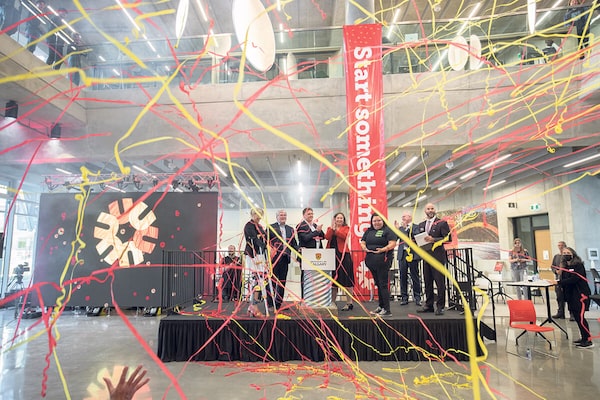
Official opening of the of the Hunter Hub students’ common at the University of Calgary. A $40-million donation by the Hunter Family Foundation facilitated the establishment of the campus-wide Hunter Hub for Entrepreneurial Thinking, benefiting all UCalgary students.Supplied
A decade ago, the concept of teaching entrepreneurial thinking at the University of Calgary was just a novel idea. The question was, can entrepreneurial thinking be taught?
That changed in 2013 when the Hunter Family Foundation donated $5-million to Calgary’s Haskayne School of Business, laying the foundation for the Hunter Centre for Entrepreneurship and Innovation – a program designed to inspire, educate and empower future entrepreneurial leaders.
The transformative impact the UCalgary program had on business students prompted the foundation to make an additional $40-million donation in 2017, establishing the campus-wide Hunter Hub for Entrepreneurial Thinking, expanding the benefits to all UCalgary students.
The Hunter family’s generosity is a prime example of how philanthropy creates opportunities that would not otherwise be possible, says Dr. James Allan, PhD, vice-president (advancement) at UCalgary.
“Donor impact, particularly over time, can be incredibly powerful whether it’s flagship programs for students, scholarships or funding the incredible research that happens here at the university,” says Dr. Allan. “Expanding the Hunter Hub’s programs created a huge impact for all our students.”
James Allan" We differentiate ourselves by developing a depth of research in areas such as child health or quantum science, and areas that matter in our community. Research that changes lives.
Vice-President (Advancement) University of Calgary
Today, the University of Calgary is the number one creator of startups among Canadian research universities – and extraordinary philanthropy over the past decade played a critical role in this achievement. Building on the Hunter Hub’s momentum, the university established the Creative Destruction Lab – Rockies and UCeed, a philanthropy-backed seed-stage investment fund to accelerate early-stage ventures and prepare them to attract outside investment.
“We already had a strong innovation ecosystem driven in part by the Hunter Hub, which set the stage for donations to UCeed,” says Dr. Allan, noting how the Alberta Children’s Hospital Foundation established the UCeed Child Health Fund, and the United Way of Calgary and Area was the lead donor to the UCeed Social Impact Fund.
“It’s not just individuals who are the philanthropists, but community organizations and industry partners as well,” says Dr. Allan.
He says the role of the university’s Office of Advancement is to build relationships in the community and understand where our missions align, and then invite partners into the life of the University.
We create lasting impact by sharing stories of transformative education and research, curating meaningful events and experiences, and empowering individuals to make impactful gifts to the university. In 2022, our efforts were bolstered by an incredible $182-million in philanthropic support, further fuelling our ability to make a difference,” adds Dr. Allan.
He says the university’s decades-long partnership with the Alberta Children’s Hospital Foundation is a good example of this.
“The university is effectively their research partner. Together, we are looking to drive stronger outcomes for children’s health and wellness, and we partner to improve diagnostics and treatments, and to get discoveries from the lab into the clinical settings faster,” says Dr. Allan.
Similarly, the university partners with the United Way on talent development and research to mobilize lasting social change, which helps the organization solve pressing social and human problems with innovative and tested solutions.
“Great research universities tend to be anchors in their community, and research is one of the most powerful things we do,” says Dr. Allan. “We differentiate ourselves by developing a depth of research in areas such as child health or quantum science, and areas that matter in our community. Research that changes lives.”
This is important because intractable social problems are generally not the specific domain of any one faculty or department, he adds.
“The world’s social problems are not defined by a university structure,” says Dr. Allan. “Take homelessness, for example: there are social and health dimensions, and there are economic dimensions to addiction. The interdisciplinary aspects are really important, and we are rather good at convening people within the university with different disciplinary strengths to come together to tackle a problem.”
Everyone can be part of making inspiring change possible, Dr. Allan adds. UCalgary Giving Day, hosted each April, is a prime opportunity for collective impact, with thousands of alumni, faculty, staff, students and friends of the university coming together each year with donations of all sizes to make a difference. It takes a community to build a community. Giving Day 2023 generated about $2.5-million in pledges that will be used to support programs and create student awards and bursaries.
For example, he says, this past April, friends and family members of Michael McClay, who died by suicide in 2021, rallied their networks, bringing together more than 300 donors to raise more than $300,000 for MIST: the Mental Health Initiative for Stress and Trauma to support leading-edge brain science and stress research to better understand, treat and de-stigmatize mental health issues.
“We’re deeply humbled by the generosity of our community, whether it’s a significant donation from one person, a family or a group of people uniting to do something remarkable through collective giving,” says Dr. Allan. “It’s all about coming together. That’s the true potential of giving.”
Advertising feature produced by Randall Anthony Communications. The Globe’s editorial department was not involved.